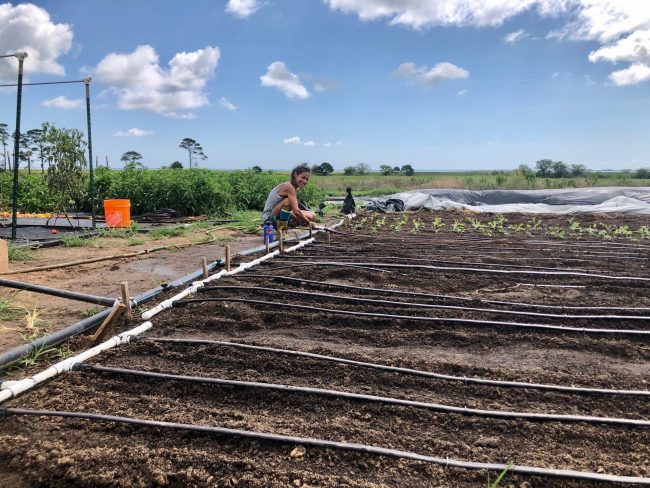
This year, The FruitGuys Community Fund was able to support 15 small farms and agricultural nonprofits in 14 different states. Thanks to the generous supporters of our Give & Grow Good 2020 campaign, this year’s grantees were awarded a total of $51,098.87 in funding. We’ve just received their interim updates, and in spite of the pandemic, these farms and organizations have done some incredible work!
The 2020 Grantees
Meet the 2020 grantees:
- Bittersweet Farm in Heuvelton, NY
- Blue Yonder Organic Farm in North Salem, IN
- Coffee Pot Farms in Winslow, AZ
- Comeback Orchards in Asbury, NJ
- Dry Creek Farm in Tahlequah, OK
- Frecon Fruit Farms in Boyertown, PA
- Hollyaire Farm in Junction City, OR
- Kansas City Community Gardens (The Giving Grove) in Kansas City, MO
- Mick Klug Farm in St. Joseph, MI
- Rancho Charanda in Redlands, CA
- Seafield Farm in Cape Charles, VA
- Shao Shan Farm in Bolinas, CA
- Sicangu Community Development (Keya Wakpala Gardens) in Mission, SD
- Sugar Hill Farmstead in Hilo, HI
- Thompson Creek Farm in Newman Lake, WA
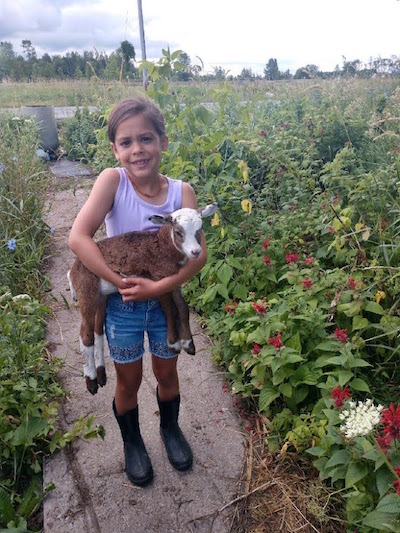 Bittersweet Farm
Bittersweet Farm
Bittersweet Farm is a 80-acre farm in Heuvelton, NY, that grows transplants, perennial plants, cut flowers, vegetables, herbs, tree fruits, berries, and nuts. They also raise Scotch Highland cattle, St. Croix sheep, Tamworth hogs, and heritage chickens. Last year, they started their Weekend Workshare Program, through which community members can work with the farm to earn the equivalent of $15 per hour in food. Their program goal is to teach farming skills and increase local food access for low-income families.
They received a $2,775 grant to expand this program by extending their growing area to include berries, vegetables, herbs, and flowers, and to purchase tools, boots, and gloves for Workshare members to use. So far, they’ve enjoyed great success in expanding their program. They’ve been able to increase their production and involve a diverse group of community members, growing the farm and its positive impacts on families and individuals in the area. Owner Ann Bennett told us, “The farm has become a social sanctuary and safe place for all. In a highly conservative rural community, that is a great achievement and a source of pride.”
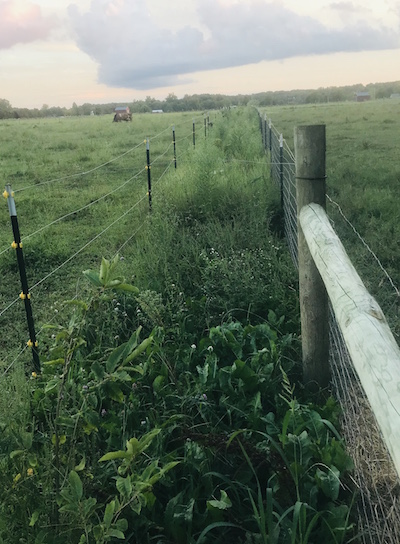 Blue Yonder Organic Farm
Blue Yonder Organic Farm
Blue Yonder Organic Farm is a 20-acre farm in North Salem, IN, that produces organic, pastured meats, eggs, shiitake mushrooms, honey, maple syrup, vegetables, berries, apples, and Asian pears that are sold through farmers markets and their online store.
They received a $4,040 grant to purchase wildflower and herb seeds, birdhouses, and protective fencing. They planted a mixed-pollinator and medicinal-herb understory as a part of a new 16-acre hedgerow system around their livestock pasture. Owner Sara Creech told us they’ve noticed, “…a great increase in the amount of birds and pollinators in the pasture, which is exciting to see!”
 Coffee Pot Farms
Coffee Pot Farms
Coffee Pot Farms is a 1-acre farm located in the Navajo Nation in Winslow, AZ, that grows greens, tomatoes, peppers, other vegetables, and seedlings.
They received a $5,000 grant to install a solar-power system and renovate a building into a post-harvest cold-storage room. They were able to complete their project, and it has been a success. Owner Cherilyn Yazzie told us, “We noticed less spoilage, we’ve been able to harvest earlier in preparation for the farmers market, [and] we’ve been able to sell more produce at the farmers market.”
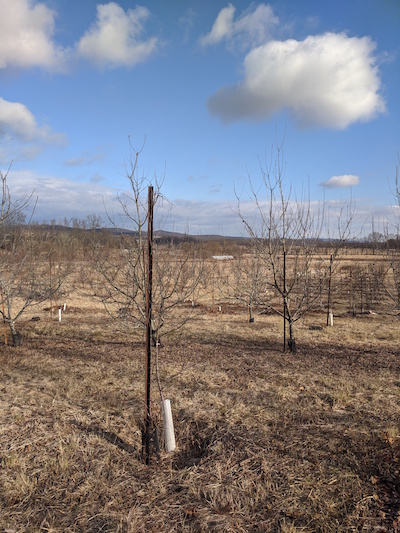 Comeback Orchards
Comeback Orchards
Comeback Orchards is a 10-acre farm in Asbury, NJ, that grows organic fruit, including apples, pears, Asian pears, plums, apricots, cherries, peaches, and nectarines, as well as organic vegetables, which they sell primarily at farmers markets.
They received a $3,116 grant to diversify their orchard and support pollinators. So far, they’ve added 350 blueberry plants, as well as nesting tubes for Blue Orchard mason bees. Orchard Manager Peter Tischler informed us that some of the nesting tubes are filling up, and they have wildflower planting planned for this fall!
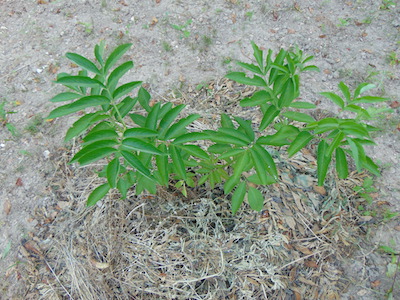 Dry Creek Farm
Dry Creek Farm
Dry Creek Farm is a 1-acre farm in Tahlequah, OK, that sells certified organic produce at their local farmers market and through a farm-to-school program.
They received a $2,012 grant to convert hog pasture into an orchard and vineyard. Dry Creek has faced several challenges with their project. Due to the pandemic, their plants arrived late and were tougher to get established. They also had issues with Japanese beetles and black blister beetles. Thankfully, they were able to overcome these challenges and Project Manager Ron Cook told us, “The berry patch is about 90% established. Next year, I’ll take cuttings and replant the skips.” He also reported that they were able to work with an Indigenous Studies group from NSU, who have been involved with the berry patch all summer long.
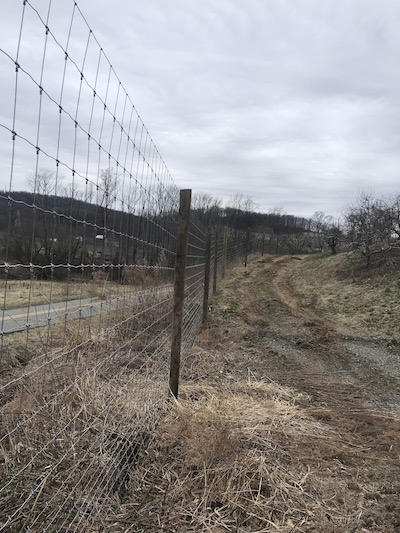 Frecon Fruit Farms
Frecon Fruit Farms
Frecon Fruit Farms Inc. is a 75-acre farm in Boyertown, PA, that produces a wide variety of fruit. They sell to farmers markets, small retailers, local schools, hospitals, food banks, and The FruitGuys.
They received a $1,991 grant to help complete a deer fencing project that will help reduce damage to their orchards from the growing population of white-tailed deer in their area. Owner Steve Frecon told us that they finished the fence in March and that the project has been a success. He told us, “The deer fence will increase the economic viability of our family farm, thus ensuring survivability of the farm for another generation [of] serving the community.”
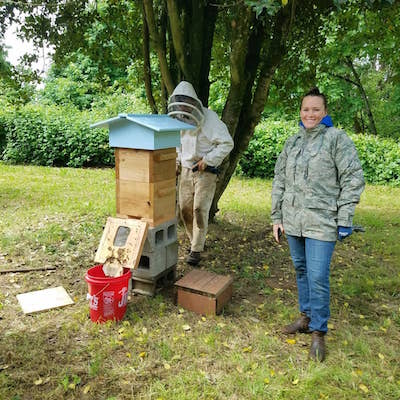 Hollyaire Farm
Hollyaire Farm
Hollyaire Farm is a 40-acre farm in Junction City, OR, that produces a wide variety of fruits, vegetables, herbs, and eggs, which they sell at their farmstand, as well as wholesale to other local farms and businesses.
They received a $3,650 grant to purchase two high tunnels to increase their production, add 50 fruit trees to their orchard, and install bee, bat, and owl boxes. So far this season, Hollyaire has planted more than 30 fruit trees, added bees to the farm, and hung bat and owl boxes. The trees and bees are thriving, and some of the bat and owl boxes are already being used. Co-owner Heather Paterson told us, “With the grant program and articles written to spread the word about our projects, we are reaching more people and providing affordable fresh produce.” They have continued to expand this season, donating a portion of their harvest to low-income families, while serving seniors and women in the WIC program through the Oregon Farm Direct Program.
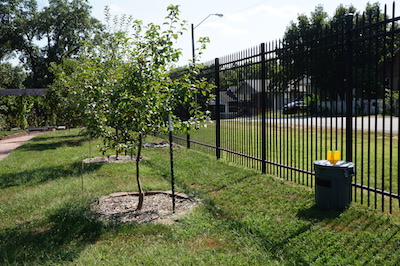 Kansas City Community Gardens (The Giving Grove)
Kansas City Community Gardens (The Giving Grove)
The Giving Grove is an agricultural nonprofit in Kansas City, MO, in conjunction with Kansas City Community Gardens. It establishes and supports orchards in low-income neighborhoods, by partnering with local nonprofits, communities of faith, and health agencies. Fruit from 176 orchards is made freely available to the local community or donated to food pantries.
They received a $3,015 grant to build and install Japanese beetle traps, designed by the University of Missouri, to protect their orchards from this destructive pest. The Giving Grove quickly adapted to pandemic restrictions and created a virtual tutorial that their volunteers used to assemble the traps. Jennifer Fink, Director of Development, told us that the traps were deployed in the beginning of the summer and were a success.
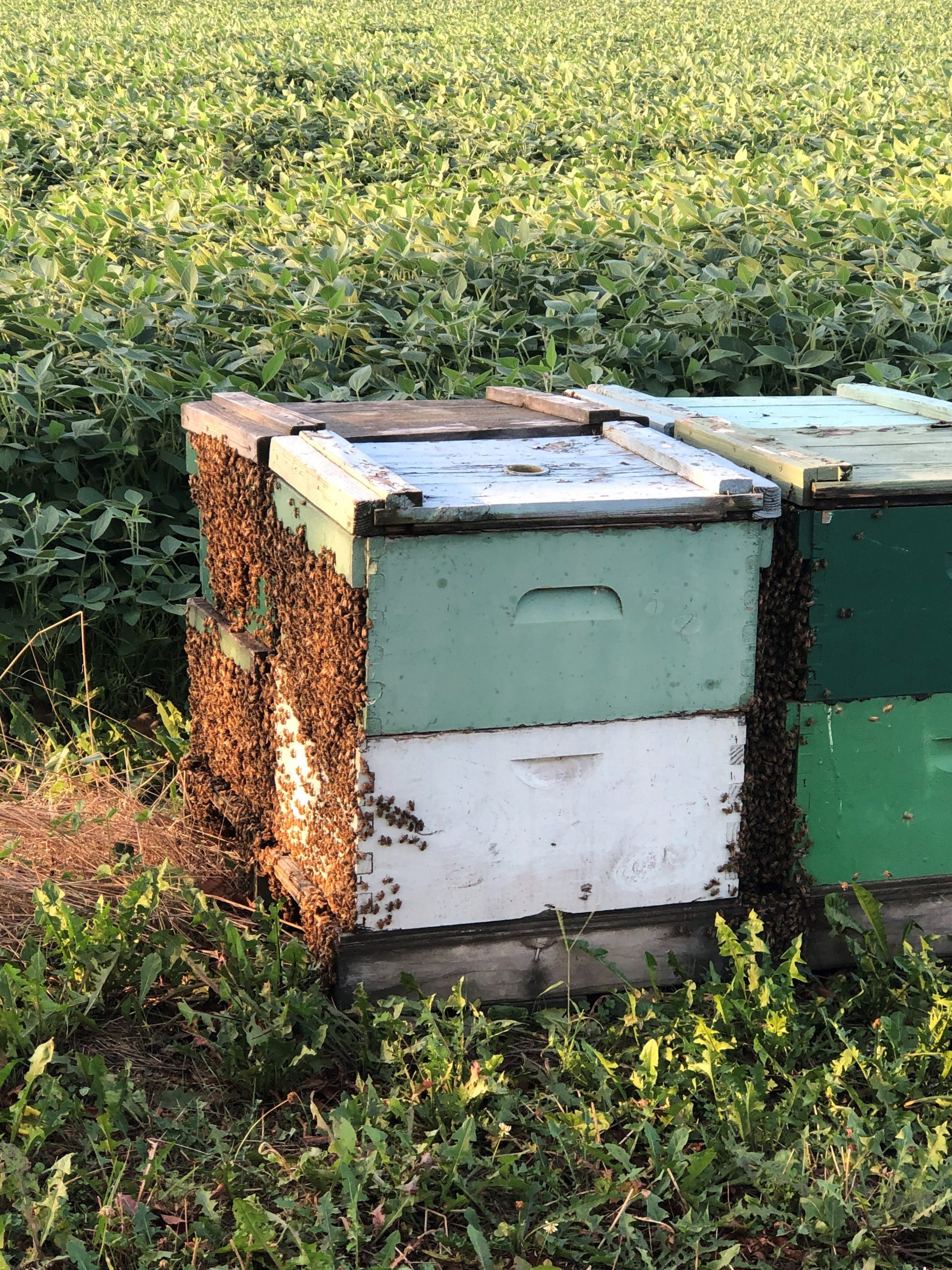 Mick Klug Farm
Mick Klug Farm
Mick Klug Farm is a 120-acre farm in St. Joseph, MI, that grows and provides to Chicago-area markets, restaurants, breweries, and small grocery outlets more than 30 varieties of fruit and vegetable crops.
They received a $4,865 grant to establish hedgerows of native plants throughout the property. Mick Klug faced some challenges due to the pandemic and a drought early in the season. So far this year, they’ve been able to plant patches of clover for bee habitat, rent more beehives, and educate their community and customers about the importance of bees. Owner Abby Schilling told us she felt the project was going well despite the setbacks and that “…good pollination occurred [in their orchard], as evidenced by the quality of fruit produced, especially in their red raspberry crops.”
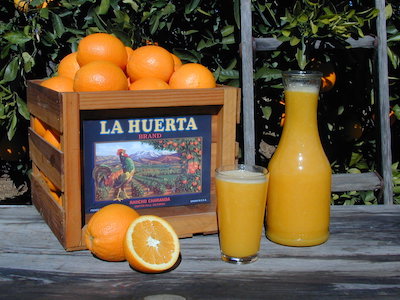 Rancho Charanda
Rancho Charanda
Rancho Charanda is a 3-acre farm in Redlands, CA, that grows oranges, tangerines, lemons, avocados, sugarcane, chile peppers, and a wide variety of native foods, such as cactus paddles, prickly pear, xoconostle, and cholla.
They received a $3,198 grant to purchase a water storage tank and replace their outdated drip irrigation system. Due to the pandemic, they saw an increase in the price of supplies and had to make some adjustments to their project, as they worked on their new irrigation system.
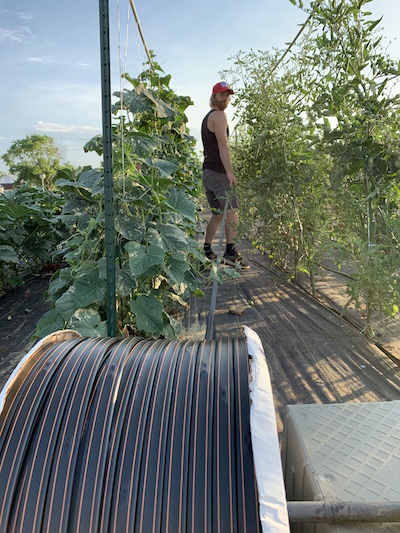 Seafield Farm
Seafield Farm
Seafield Farm is a 1-acre farm in Cape Charles, VA, that grows a wide variety of vegetables, herbs, flowers, and pecans, as well as producing eggs and honey.
They received a $2,090 grant to install drip irrigation and two hydrant water spigots on their farm. Seafield has their new irrigation system all set up for fall crops! Owner Jenna Rodriguez told us, “There are so many positive outcomes, from the [reduced] time we have to spend thinking about watering to the successful seed germination, [fewer] weeds in between the beds, [a reduced need to move] the sprinklers based on the wind, and so much more.”
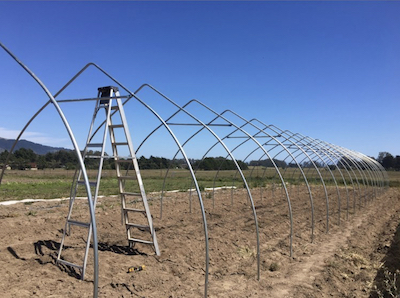 Shao Shan Farm
Shao Shan Farm
Shao Shan Farm is a 5-acre farm in Bolinas, CA, that grows organic Asian heritage vegetables, which are sold to chefs, farmers markets, grocery stores, and regional communities. They also donate produce to their local “Free Food Fridays” food pantries, senior dinner programs, and bi-weekly gleanings.
They received a $4,881 grant to purchase a rotary mower and hoop house. They were able to construct their hoop house and have been using it to grow cucumbers and bitter melons, a culturally appropriate crop that they previously lacked the space to grow. Farmer Scott Chang-Fleeman told us, “[We] were also able to open up space in our previous hoop [house] to isolate a rare Chinese chili pepper variety that we can now save on seed, and [which we] are hoping to [grow at] a widely available quantity to share with the community.” They plan to use their new mower to terminate their winter cover crop next spring.
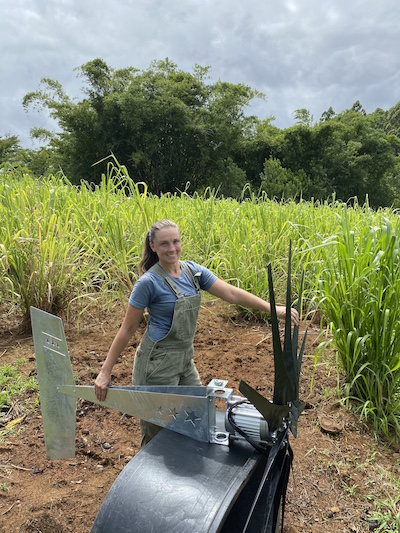 Sugar Hill Farmstead
Sugar Hill Farmstead
Sugar Hill Farmstead is a 10-acre farm in Hilo, HI, that produces pastured meats and eggs, raw honey, and organic bananas. Their livestock supplies the only meat CSA available on the Big Island. The bananas are sold to a local smoothie shop or dehydrated and sold at another farm store.
They received a $4,351 grant to purchase two windmills and expand their solar-power system, decreasing their reliance on generators and further reducing their fossil fuel consumption. Sugar Hill Farmstead made a small change to their project, opting to purchase one larger turbine instead of two smaller ones. Owner Brittany Anderson told us that they’ve been able to clear the land, consult with an electrical engineer about integrating their new turbine into their current solar-power system, and construct the turbine.
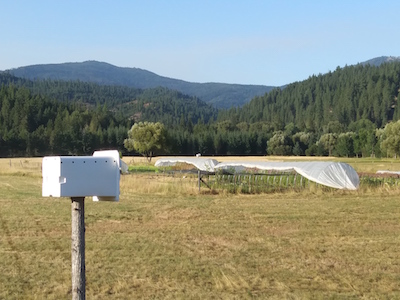 Thompson Creek Farm
Thompson Creek Farm
Thompson Creek Farm is a 2-acre farm in Newman Lake, WA, that grows a wide variety of vegetables, berries, and fruit, which they sell through a CSA and to local farmers markets and restaurants.
They received a $3,592 grant to purchase owl and bat boxes, and a hoop house. They were able to set up their owl and bat boxes, as well as their hoop house, early this season. Co-owner Marcus Intinarelli told us that the owl boxes have been inhabited, stating, “We can see and hear the owls each night, and we have noticed less rodent pressure this year.” So far, they’ve also had great success with a seed crop they’re growing in their new hoop house.
We’re still waiting on an update from Sicangu Community Development (Keya Wakpala Gardens) so stay tuned to hear about their project.
So much growth in spite of unprecedented circumstances! The FruitGuys Community Fund couldn’t be prouder of our all-star 2020 grantees, as they grow good across the U.S. Stay tuned for another update on these projects, as the 2020 grantees will share their final updates at the end of the year, just as we gear up for the 2021 grant cycle. If you know a small, independent farmer, let them know our grant cycle will open in December. We look forward to supporting another group of hard-working, indispensable small farms and agricultural nonprofits and the communities they call home.



